
The Tortricidae are a family of moths, commonly known as tortrix moths or leafroller moths, in the order Lepidoptera. This large family has over 11,000 species described, and is the sole member of the superfamily Tortricoidea, although the genus Heliocosma is sometimes placed within this superfamily. Many of these are economically important pests. Olethreutidae is a junior synonym. The typical resting posture is with the wings folded back, producing a rather rounded profile.

Ptycholoma lecheana, the Leche's twist moth, is a moth of the family Tortricidae. It is found in Europe, China, Korea, Japan, Russia and Asia Minor.

Choristoneura rosaceana, the oblique banded leaf roller or rosaceous leaf roller, is a moth of the family Tortricidae. It is native to North America, but has been accidentally introduced into other parts of the world.

Philedone is a genus of moths belonging to the subfamily Tortricinae of the family Tortricidae. It contains only one species, Philedone gerningana, the cinquefoil tortrix or cinquefoil twist, which is found in Asia and Europe. It was first described by the Austrian lepidopterists Michael Denis and Ignaz Schiffermüller in 1775.

Gypsonoma aceriana, the poplar shoot-borer, is a moth of the family Tortricidae. It is found from Europe to Russia, eastern Turkey and Iraq. It is also present in North Africa.

Epinotia nisella is a moth of the family Tortricidae which is found in the Palearctic, Europe and North America. It was first described by Carl Alexander Clerck in 1759.
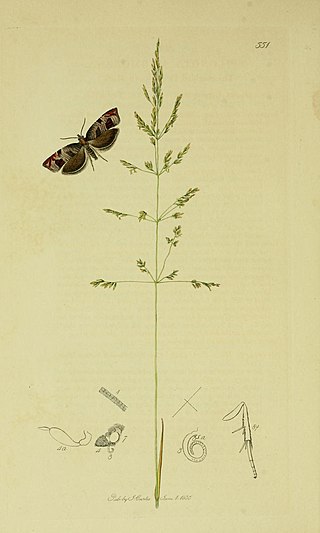
Acleris maccana, the marbled dog's-tooth tortrix, is a moth of the family Tortricidae. The species was first described by Georg Friedrich Treitschke in 1835. It is found from Europe, east across the boreal regions to Siberia.

Pseudosciaphila duplex, the aspen leaftier, poplar leafroller or spotted aspen leafroller, is a moth of the family Tortricidae. It is found in North America from Quebec and New England to northern California and British Columbia.

Phyllonorycter apparella, the aspen leaf blotch miner moth, is a moth of the family Gracillariidae. It is found in most of Europe. It is also present in Turkey and North America.

Micrurapteryx salicifoliella is a moth of the family Gracillariidae. It is known from Canada and the United States.
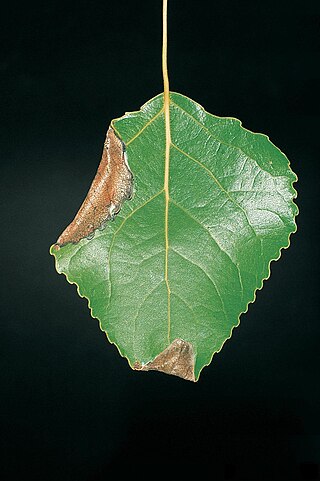
Ancylis laetana is a moth of the family Tortricidae. It is found in most of Europe, except the Iberian Peninsula, the Balkan Peninsula, Iceland, Ireland and Ukraine.

Cochylichroa hospes, the banded sunflower moth, is a moth of the family Tortricidae. It is found from North Carolina to Colorado, Utah, New Mexico and northern Arizona.
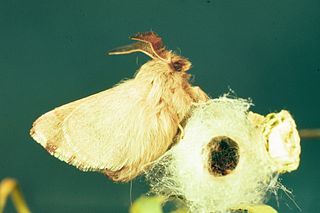
Malacosoma incurva, the southwestern tent caterpillar moth, is a species of moth of the family Lasiocampidae. It was first described by Henry Edwards in 1882. It is found in south-western North America, including Arizona, New Mexico, Nevada and Utah.

Phtheochroa schreibersiana is a species of moth of the family Tortricidae. It is found from Europe to the Near East, the Caucasus and southern Russia (Sarepta). The habitat consists of hedgerows, marshes, river-banks and other damp areas.

Argyrotaenia mariana, the gray-banded leafroller moth, is a species of moth of the family Tortricidae. It is found in North America, where it has been recorded from Connecticut, Florida, Georgia, Illinois, Indiana, Kentucky, Maine, Maryland, Massachusetts, New Brunswick, New Hampshire, New York, North Carolina, Ohio, Ontario, Pennsylvania, Quebec, Tennessee and West Virginia.
Argyrotaenia quadrifasciana, the four-lined leafroller moth, four-banded leafroller or lesser all-green leafroller, is a species of moth of the family Tortricidae. It is found in North America, where it has been recorded from Nova Scotia to West Virginia, west to Arkansas and north to Alberta. The habitat consists of orchards and shrubby areas.
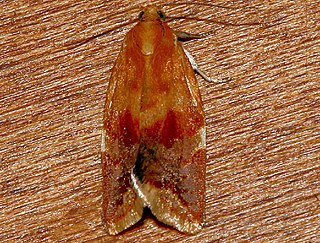
Clepsis persicana, the white triangle tortrix or the green needleworm, is a species of moth of the family Tortricidae. It is found in North America, where it has been recorded from Alaska and British Columbia to Newfoundland and south to Virginia and west to California. The habitat consists of coniferous and mixed coniferous forests.
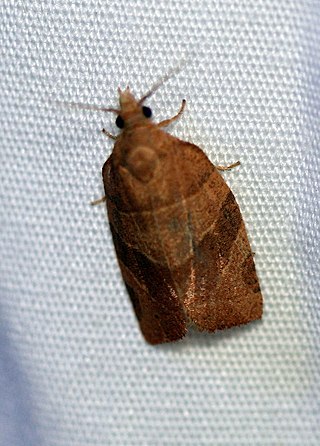
Pandemis limitata, the three-lined leafroller, is a species of moth of the family Tortricidae. It is found in North America, where it has been recorded from Nova Scotia to British Columbia and from the east coast west to the Rocky Mountains and Arizona. It has also been recorded from Durango in Mexico.

Pandemis lamprosana, the woodgrain leafroller moth, is a species of moth of the family Tortricidae. It is found in North America, where it has been recorded from the north-eastern United States, Quebec and Ontario.
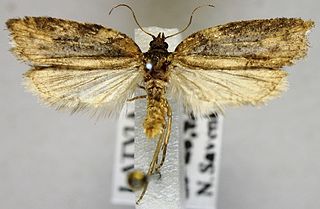
Acleris scabrana, the gray rough-wing moth, is a species of moth of the family Tortricidae. It is found in Europe, where it has been recorded from France, Belgium, the Netherlands, Germany, Austria, Switzerland, the Czech Republic, Slovakia, Poland, Hungary, Romania, Finland, Latvia, Lithuania, Ukraine and Russia. It is also found in Kazakhstan, Tian Shan, Yakutia, Asia Minor and North America, where it has been recorded from Alberta and British Columbia to California.























